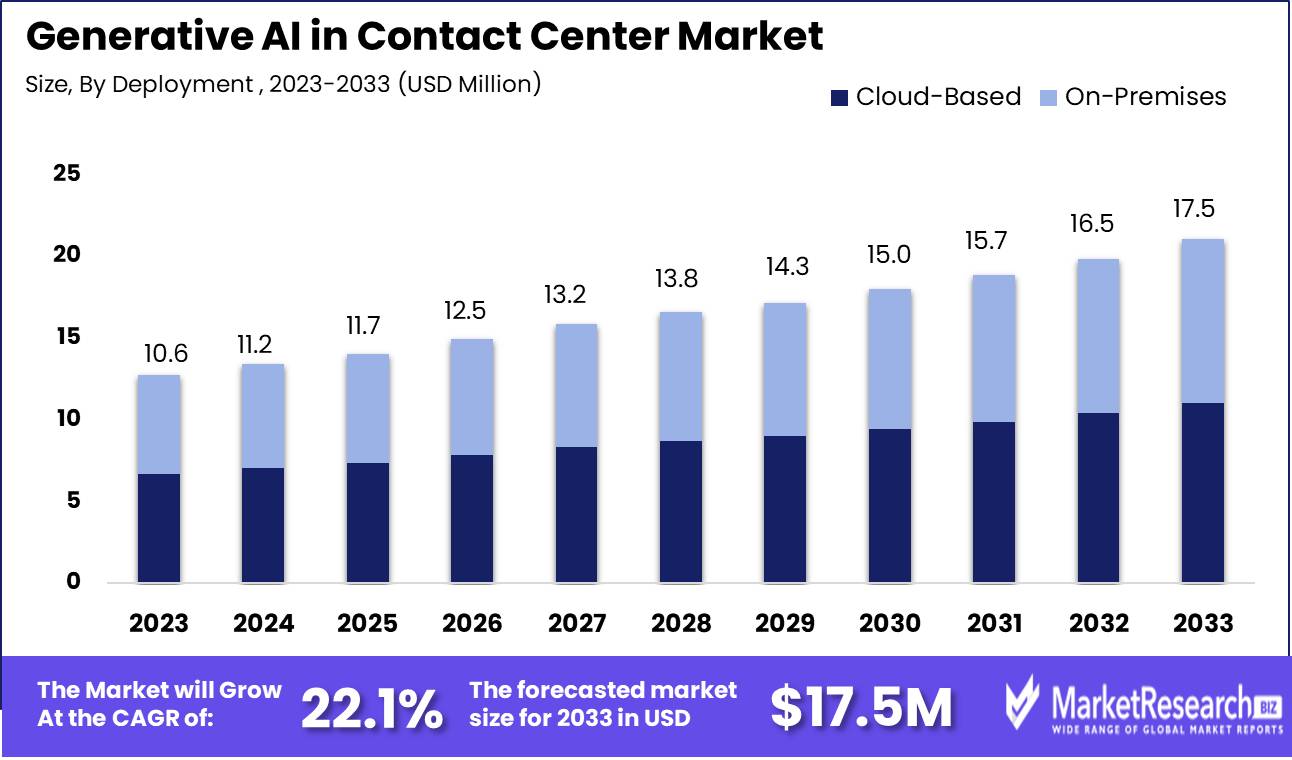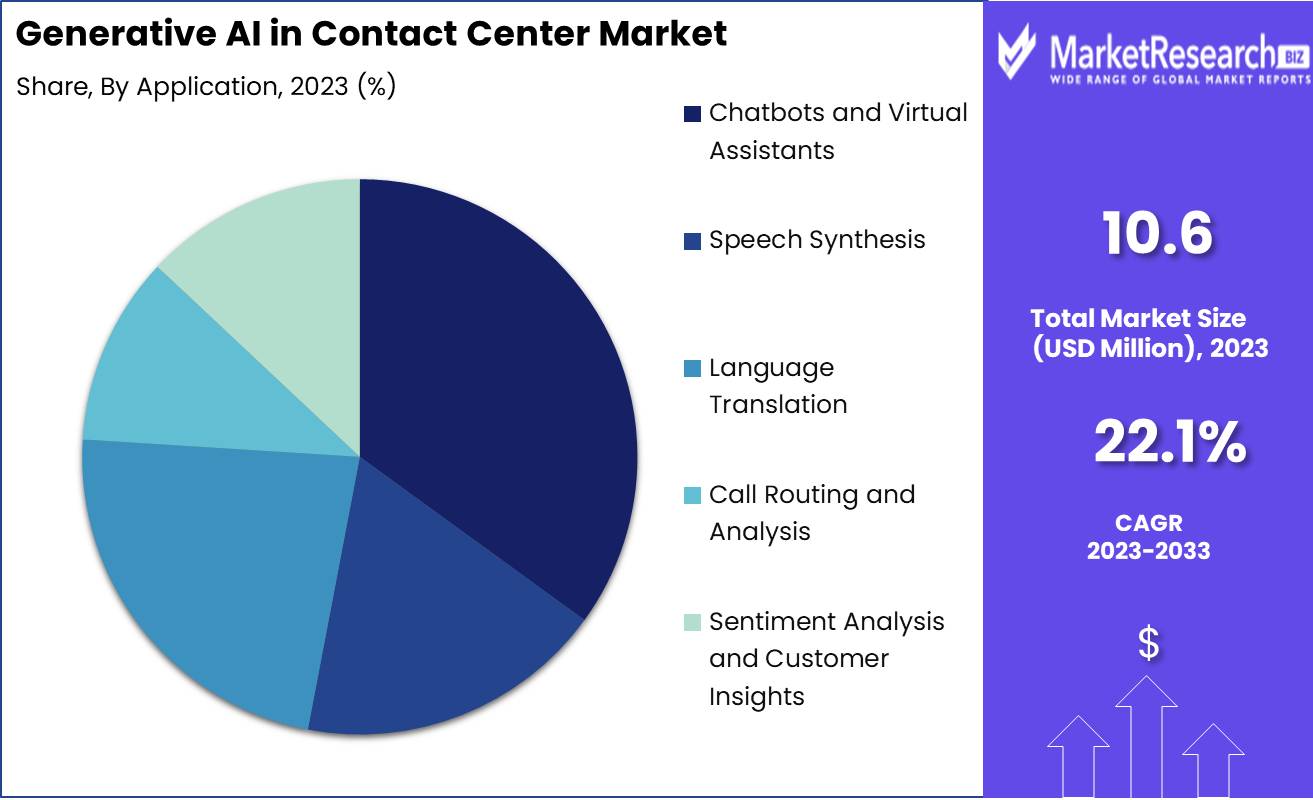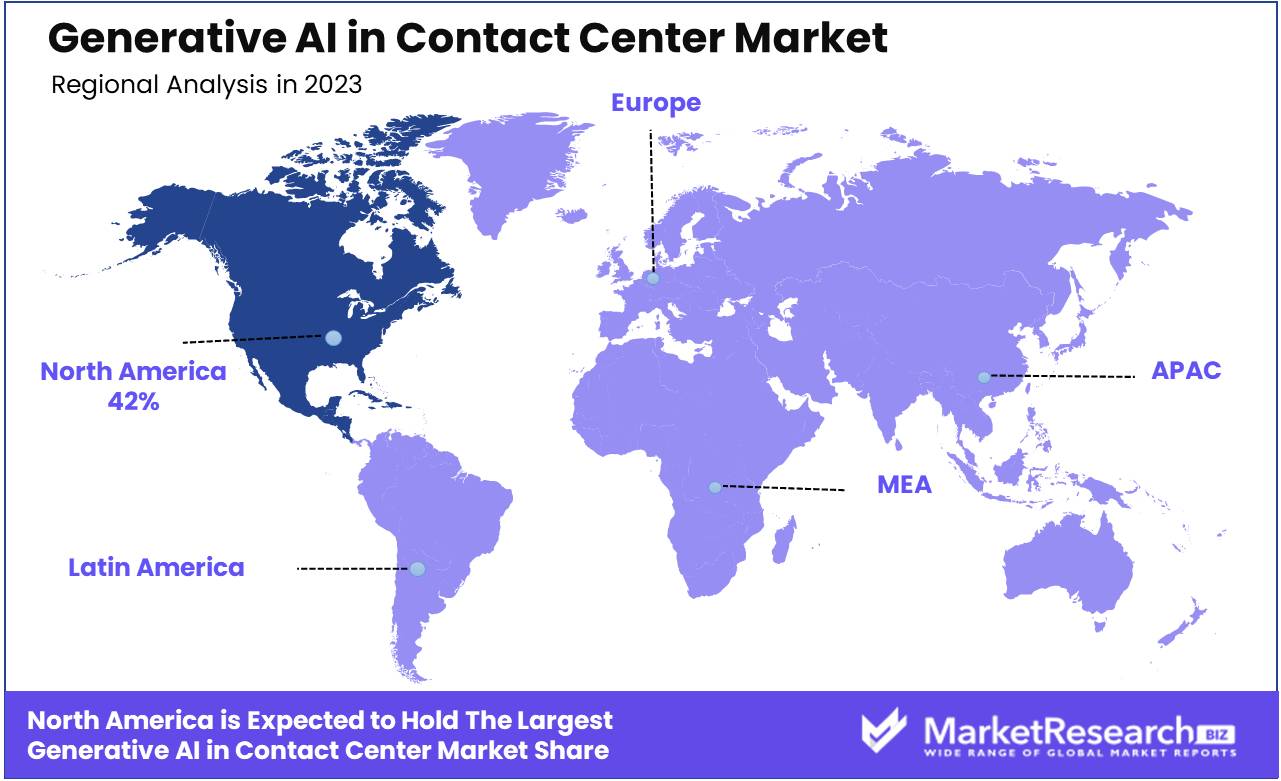
Generative AI in Contact Center Market By Deployment Mode (Cloud-Based and On-Premises), By Application (Chatbot & Virtual Assistants, Speech Synthesis, Language Translation, Call Routing & Analysis, and Sentiment Analysis & Customer Insights), By Technology, By Region and Companies - Industry Segment Outlook, Market Assessment, Competition Scenario, Trends, and Forecast 2024-2033
-
38793
-
April 2024
-
300
-
-
This report was compiled by Vishwa Gaul Vishwa is an experienced market research and consulting professional with over 8 years of expertise in the ICT industry, contributing to over 700 reports across telecommunications, software, hardware, and digital solutions. Correspondence Team Lead- ICT Linkedin | Detailed Market research Methodology Our methodology involves a mix of primary research, including interviews with leading mental health experts, and secondary research from reputable medical journals and databases. View Detailed Methodology Page
-
Report Overview
Generative AI in Contact Center Market size is expected to be worth around USD 17.5 Mn by 2033 from USD 10.6 Mn in 2023, growing at a CAGR of 22.1% during the forecast period from 2024 to 2033.
The surge in demand for new advanced technologies and enhanced customer experiences are some of the main key driving factors for generative AI in contact centers. Generative artificial intelligence is a type of AI system that is capable of producing text, pictures, and other media outputs. The GenAI model understands the format and structure of their input training information and then produces new data that has the same features. An article published by The Guardian in July 2023, highlights that Meta which was earlier known as Facebook, has introduced an open-source version of an AI model, Llama 2 for public use purposes. Llama 2 provides easy access to advanced AI technology, that enables a wide range of businesses and developers to experiment with and develop upon the technology.

Generative AI plays an important role in contact centers as nowadays customers want to have an extraordinary service that comprises instant and detailed responses to their queries, whether it is about placing an order, asking for product exchange, or requesting for billing concern. Customers also expect to have services that are 24x7 available all across the various vertical channels. An article published by BCG in July 2023, highlights that the general public has started to examine GenAI potentialities and the technology is gaining rapid acceptance and appreciation for the multiple solutions it provides. If this technology is implemented in customer service operations, it will boost work productivity by around 30% to 50% or more. Additionally, 95% of global customer service giants expect their customers to be attended to by an AI chatbot at some point in their customer service interactions within the next three years.
Many companies have boarded their AI expedition and are curious to understand and use the power of GenAI for customer contact center services. This technology helps with the customer service team in contact centers as it manages a lot of daily tasks, resolves customers’ queries, and helps enhance efficacy. It also consumes time and money. GenAI is also being used for customer data to offer customized answers and suggestions and provide personalized solutions to improve the customer experience. The demand for GenAI in contact centers will increase due to its requirement in various vertical industries with contact center services that will help in market expansion during the coming years.
Key Takeaways
- Market Growth: Generative AI in Contact Center Market size is expected to be worth around USD 17.5 Mn by 2033 from USD 10.6 Mn in 2023, growing at a CAGR of 22.1% during the forecast period from 2024 to 2033.
- By Deployment Mode: Cloud-based solutions dominate the Generative AI Contact Center Market with a 67% share in 2023.
- By Application: In 2023, chatbots and virtual assistants dominated the Generative AI Contact Center Market with a 47% share.
- By Technology: In 2023, Automated Response Generation led Generative AI in Contact Centers with a 55% market share.
- Regional Dominance: Generative AI in contact centers grows, led by North America at 42%, followed by Europe and Asia-Pacific.
- Growth Opportunity: Generative AI in contact centers enhances efficiency, scalability, and personalized customer engagement, boosting satisfaction and sales.
Driving factors
Improved Customer Service: Enhancing Efficiency and Customer Satisfaction
Generative AI significantly influences the contact center market by transforming customer service operations. This technology enables rapid, consistent, and highly personalized responses, directly contributing to enhanced customer satisfaction. For instance, generative AI can manage multiple customer inquiries simultaneously, reducing wait times and increasing the efficiency of response teams. By analyzing interactions in real-time, AI tools provide representatives with information and suggestions to improve the quality of each customer interaction.
Statistics show that AI-driven tools can reduce call handling times by up to 30%, dramatically boosting operational efficiency and customer satisfaction. This improvement in service quality not only retains existing customers but also attracts new ones due to the high level of service efficiency. In competitive markets, this aspect becomes a crucial differentiator, driving growth as businesses seek to deploy advanced AI tools to gain an edge.
Customer Issue and Claim Resolution: Streamlining Processes and Reducing Costs
The integration of generative AI into the resolution of customer issues and claims represents a pivotal development in contact centers. AI systems are adept at parsing complex customer queries and determining optimal solutions swiftly, which is particularly valuable in high-volume settings. This capability ensures that customer issues are addressed more accurately and promptly, which in turn enhances customer trust and loyalty.
Moreover, the application of AI in claim resolutions can lead to substantial cost savings for organizations. By automating repetitive tasks and responses, AI reduces the need for extensive human intervention, thereby cutting labor costs and operational overheads. The efficiency gained through AI can decrease the average handling time per claim, which directly correlates with reduced operational expenses and improved throughput.
Sentiment Analysis and Tracking: Tailoring Interactions and Predicting Behaviors
Generative AI excels in sentiment analysis, allowing contact centers to understand and react to the emotional tone and context of customer interactions. This technology not only identifies positive or negative sentiments but also adapts responses accordingly, enhancing the customer's overall experience. By analyzing patterns over time, AI can predict customer behaviors and customer preferences, which allows companies to proactively address potential issues and tailor marketing strategies.
This proactive engagement strategy leads to higher customer retention rates. Statistics indicate that leveraging AI for sentiment analysis can improve customer retention by up to 25%. This capability to anticipate and meet customer needs before they escalate into larger issues plays a critical role in driving growth within the AI-enhanced contact center market.
Restraining Factors
Copyright and Legal Exposure: A Barrier to Innovation and Adoption
The integration of generative AI into contact centers presents considerable opportunities for enhancing real-time customer interactions and operational efficiency. However, one of the most significant barriers is the potential for copyright and legal exposure. As AI systems often rely on vast amounts of data to train algorithms, including potentially copyrighted material, companies face the risk of inadvertently violating intellectual property rights. This can lead to lawsuits and financial liabilities, which may deter companies from adopting or fully leveraging AI technologies.
Furthermore, generative AI's ability to create new, derivative works could pose additional legal challenges. For instance, an AI that generates script responses or customer interaction logs may inadvertently produce content that mirrors protected material. The ambiguity in current intellectual property laws regarding outputs generated by AI complicates compliance efforts and could stifle innovation as firms may opt for conservative approaches to avoid legal risks.
Data Privacy Violations: Compounding Risks with Compliance and Public Trust
Another major restraining factor is the risk of data privacy violations, which overlaps significantly with legal exposure but focuses more on the handling of personal information. Generative AI technologies in contact centers use customer data to personalize service interactions and improve service quality. However, without stringent controls, this can lead to breaches of data privacy, exposing sensitive customer information and violating regulations such as GDPR in Europe or CCPA in California.
The consequences of such violations are twofold: firstly, there are financial penalties that can be substantial enough to discourage AI adoption outright. Secondly, and perhaps more damaging in the long term, is the erosion of customer trust. In industries where trust is a cornerstone of customer relationships, any hint of mishandling personal data can lead to a loss of business and damage to brand reputation.
By Deployment Mode Analysis
Cloud-based solutions dominate the Generative AI Contact Center Market with a 67% share in 2023.
In 2023, Cloud-Based solutions held a dominant market position in the by-deployment mode segment of the Generative AI in the Contact Center Market, capturing more than a 67% share. This significant market penetration can be attributed to the scalability, flexibility, and cost-efficiency that cloud-based platforms offer. Businesses increasingly recognize the advantages of cloud deployments in enhancing customer interactions through AI-driven insights and automation. The agility offered by cloud solutions allows for rapid adaptation to evolving consumer needs and technological advancements. Moreover, the cloud model's pay-as-you-go structure is particularly appealing for organizations looking to optimize operational costs while benefiting from high computational power and minimal upfront investments.
On the other hand, the On-Premises deployment mode continues to cater to organizations prioritizing data control, security, and compliance. While this segment has seen slower growth, it remains crucial for sectors such as banking, healthcare, and government, where stringent data regulations and privacy concerns dictate the need for localized data handling and processing. Although on-premises solutions require significant initial capital expenditure and ongoing maintenance costs, they offer enhanced control over the AI tools, which is a critical factor for certain businesses. Despite the overwhelming trend towards cloud adoption, the enduring relevance of on-premises solutions highlights the diversified needs and strategic priorities within the Generative AI in the Contact Center Market.
By Application Analysis
In 2023, chatbots and virtual assistants dominated the Generative AI Contact Center Market with a 47% share.
In 2023, Chatbots and Virtual Assistants commanded a prominent market position within the "By Application" segment of the Generative AI in the Contact Center Market. This segment captured more than 47% market share, underscoring the pivotal role that these technologies play in modernizing customer interactions. Chatbots and virtual assistants leverage advanced natural language model processing and machine learning algorithms to offer real-time, conversational customer service channels, efficiently handling a broad spectrum of queries with increasing autonomy. This capability not only enhances customer satisfaction by providing immediate responses and 24/7 service but also optimizes operational efficiencies by reducing the workload on human agents.
Following chatbots and virtual assistants, other significant segments include Speech Synthesis, Language Translation, Call Routing and Analysis, Sentiment Analysis, and Customer Insights. Speech Synthesis has been increasingly adopted across the contact center AI industry to produce more natural and engaging previous interactions, thereby improving the customer experience.
Language Translation and Call Routing and Analysis are crucial for global operations, enabling businesses to support a diverse customer base and intelligently manage incoming calls to improve resolution times. Lastly, the Sentiment Analysis and Customer Insights segment is gaining traction as businesses strive to extract deeper insights from customer interactions, thereby informing product development and enhancing customer engagement strategies.
Each of these segments contributes uniquely to the overarching enhancement of customer service tools capabilities through Generative AI. The integration of these technologies not only drives significant improvements in customer engagement metrics but also offers substantial cost efficiencies and scalability for businesses looking to expand their reach and enhance service quality. As these technologies continue to evolve, they are expected to create new standards for responsiveness and personalization in contact centers around the globe.

By Technology Analysis
In 2023, Automated Response Generation led Generative AI in Contact Centers with a 55% market share.
In 2023, Automated Response Generation held a dominant market position in the "By Technology" segment of the Generative AI in Contact Center Market, capturing more than a 55% share. This technology, pivotal for streamlining communication between clients and businesses, leverages advanced algorithms to simulate human-like interactions, efficiently handling a high volume of inquiries without compromising the quality of service. The surge in its adoption can be attributed to its capacity to reduce operational costs, improve response times, and enhance customer satisfaction across various industries, from telecommunications to financial services.
Natural Language Processing (NLP) and Voice Recognition and Speech-to-Text technologies also play crucial roles in the ecosystem of contact center AI. NLP technologies facilitate the understanding and processing of human language, enabling systems to interpret customer queries more accurately and assist in delivering more pertinent responses. Meanwhile, Voice Recognition and Speech-to-Text technology have been instrumental in transforming vocal communications into actionable data, thereby optimizing the automation process and allowing for more sophisticated and nuanced customer interactions.
Furthermore, Knowledge Base Generation and Predictive Analytics are gaining traction, enhancing the capabilities of AI in contact centers. Knowledge Base Generation supports the creation of vast, accessible repositories of information that AI systems can draw from to provide accurate information to customers. Predictive Analytics, on the other hand, uses historical data to anticipate customer inquiries and issues, paving the way for preemptive action and personalized service offerings. These technologies collectively contribute to a more dynamic, efficient, and customer-focused contact center environment, positioning businesses to better meet the evolving demands of the digital age.
Key Market Segments
By Deployment Mode
- Cloud-Based
- On-Premises
By Application
- Chatbots and Virtual Assistants
- Speech Synthesis
- Language Translation
- Call Routing and Analysis
- Sentiment Analysis and Customer Insights
By Technology
- Natural Language Processing (NLP)
- Automated Response Generation
- Knowledge Base Generation
- Voice Recognition and Speech-to-Text
- Predictive Analytics
Growth Opportunity
Automated Customer Service: Enhancing Efficiency and Scalability
The global generative AI market for contact centers is poised to transform customer service dynamics by significantly enhancing operational efficiency and scalability. The integration of generative AI technologies promises to automate routine inquiries and customer interactions, reducing the workload on human agents and allowing them to focus on more complex issues. This shift not only optimizes resource allocation but also minimizes response times, driving higher customer satisfaction and loyalty. Companies that leverage these artificial intelligence capabilities can expect to see a marked improvement in service metrics, potentially leading to a stronger competitive position in their respective markets.
Personalized Customer Interactions: Elevating Customer Engagement
Another profound opportunity presented by generative AI is the ability to deliver highly personalized customer interactions. By analyzing vast amounts of data in real time, AI systems can tailor conversations to individual customer preferences and histories, offering a level of personalization that was previously unattainable.
This capability is particularly valuable in an era where customer expectations are continuously rising, and personalized service can significantly influence purchasing decisions. The result is not just improved customer engagement but also enhanced upselling and cross-selling opportunities as AI-driven insights enable more targeted and effective sales strategies.
Latest Trends
Multimodal Generative AI Integration
The integration of multimodal generative AI into contact centers is expected to redefine customer service paradigms significantly. This technology, which processes and generates responses based not just on text but also on visual and auditory inputs, offers a more holistic approach to understanding and solving customer queries.
For instance, by analyzing tone, facial expressions, and verbal cues, these systems can deliver more nuanced and context-aware solutions, enhancing customer satisfaction and engagement. As businesses increasingly prioritize comprehensive customer experience strategies, the adoption of multimodal capabilities could become a competitive differentiator in the global market.
Enhanced Focus on Data Security and Privacy
With the proliferation of AI technologies, including generative AI in contact centers, data security and privacy concerns are more critical than ever. These issues are anticipated to drive the development of new standards and technologies aimed at safeguarding sensitive information. Contact centers are likely to adopt advanced encryption methods, secure data storage solutions, and stricter compliance with global data protection regulations such as GDPR and CCPA.
Furthermore, the rise of privacy-enhancing technologies (PETs) will facilitate the secure utilization of customer data for training AI models without compromising individual privacy rights. This trend not only addresses regulatory requirements but also strengthens trust between consumers and companies, a crucial factor in customer retention and brand loyalty.
Regional Analysis
Generative AI in contact centers grows, led by North America at 42%, followed by Europe and Asia-Pacific.
The adoption of generative AI in contact centers is transforming customer service teams across various regions, each exhibiting unique trends and levels of integration. North America, leading the charge, accounts for approximately 42% of the global market. This dominance is primarily driven by the region's robust technological infrastructure and the presence of major tech companies that are pioneering AI advancements. U.S.-based firms are not only implementing AI to enhance customer interaction through personalized and efficient service but are also leveraging these technologies to gain insights from customer data, thereby improving overall business strategies. The high adoption rate is further supported by favorable regulatory environments and substantial investments in AI research and development.

Europe follows closely, with a strong emphasis on data protection and privacy, aligned with the General Data Protection Regulation (GDPR). This regulatory framework shapes how AI is implemented in the contact center platform, focusing on ethical AI use and transparency. European companies are increasingly adopting cloud-based AI solutions to offer multilingual support and to cope with high customer service demands, which is pivotal given the diverse linguistic landscape. The integration of AI is not just enhancing customer service experience but also ensuring compliance with stringent data security standards, making Europe a critical player in the global market.
Meanwhile, the Asia Pacific region is witnessing rapid growth in the generative AI sector due to its significant advancements in digital infrastructure and a sharp increase in tech-savvy consumer populations. Countries like China, Japan, and South Korea are at the forefront, driving innovation in AI technologies. The rising demand for automated and efficient customer service solutions in heavily populated countries is fostering growth in this sector. Moreover, the increasing digital transformation in India and Southeast Asia is expected to propel further growth, making Asia Pacific a key region to watch in the global generative AI in the contact center market.
Key Regions and Countries
North America
- The US
- Canada
- Rest of North America
Europe
- Germany
- France
- The UK
- Spain
- Netherlands
- Russia
- Italy
- Rest of Europe
Asia-Pacific
- China
- Japan
- Singapore
- Thailand
- South Korea
- Vietnam
- India
- New Zealand
- Rest of Asia Pacific
Latin America
- Mexico
- Brazil
- Rest of Latin America
Middle East & Africa
- Saudi Arabia
- South Africa
- UAE
- Rest of the Middle East & Africa
Key Players Analysis
In the landscape of the global Generative AI in the Contact Center Market, several key players exert significant influence, driving innovation and shaping the industry's trajectory. Among these, stalwarts such as IBM, Google, and Amazon Web Services (AWS) stand prominently. IBM, with its deep-rooted expertise in artificial intelligence (AI) and cognitive computing, continues to lead the charge in developing advanced solutions tailored for contact centers, fostering seamless interactions and enhanced customer experiences.
Similarly, Google, leveraging its extensive research in natural language processing (NLP) and machine learning, remains a pivotal force in driving the evolution of generative AI within contact center environments. Its robust suite of AI tools and cloud-based infrastructure empowers businesses to harness the potential of AI-driven customer interactions effectively.
Moreover, Amazon Web Services (AWS) emerges as a formidable contender in this arena, capitalizing on its expansive cloud computing capabilities and AI services portfolio. As organizations increasingly gravitate towards cloud-native solutions, AWS offers scalable and versatile AI-powered contact center solutions, ensuring operational agility and scalability.
Market Key Players
- IBM
- Amazon Web Services (AWS)
- Genesys
- Nuance Communications
- Microsoft
- Five9
- Other Key Player
Recent Development
- In April 2024, Amazon and Anthropic announced an expanded partnership where Anthropic will use AWS as its primary cloud provider for developing and deploying AI models, and Amazon will invest up to $4 billion in Anthropic, gaining a minority ownership stake.
- In February 2024, Wipro Limited expanded its partnership with IBM, launching the Wipro Enterprise AI-Ready Platform, powered by IBM Watson AI, to accelerate enterprise adoption of Generative AI. The collaboration establishes a centralized tech hub, IBM TechHub@Wipro, to support joint clients in their AI initiatives, marking a significant step toward advancing robust, reliable AI solutions.
- In September 2023, Cisco announced its definitive agreement to acquire Splunk for $28 billion, aiming to enhance organizational security and resilience through AI-powered solutions.
Report Scope
Report Features Description Market Value (2023) USD 10.6 Million Forecast Revenue (2033) USD 17.5 Million CAGR (2024-2032) 22.1% Base Year for Estimation 2023 Historic Period 2016-2023 Forecast Period 2024-2033 Report Coverage Revenue Forecast, Market Dynamics, COVID-19 Impact, Competitive Landscape, Recent Developments Segments Covered By Deployment Mode (Cloud-Based, On-Premises), By Application (Chatbots and Virtual Assistants, Speech Synthesis, Language Translation, Call Routing and Analysis, Sentiment Analysis and Customer Insights), By Technology (Natural Language Processing (NLP), Automated Response Generation, Knowledge Base Generation, Voice Recognition and Speech-to-Text, Predictive Analytics) Regional Analysis North America - The US, Canada, Rest of North America, Europe - Germany, France, The UK, Spain, Italy, Russia, Netherlands, Rest of Europe, Asia-Pacific - China, Japan, South Korea, India, New Zealand, Singapore, Thailand, Vietnam, Rest of Asia Pacific, Latin America - Brazil, Mexico, Rest of Latin America, Middle East & Africa - South Africa, Saudi Arabia, UAE, Rest of Middle East & Africa Competitive Landscape IBM, Google, Amazon Web Services (AWS), Genesys, Nuance Communications, Microsoft, Five9, Other Key Player Customization Scope Customization for segments, region/country-level will be provided. Moreover, additional customization can be done based on the requirements. Purchase Options We have three licenses to opt for Single User License, Multi-User License (Up to 5 Users), Corporate Use License (Unlimited User and Printable PDF) -
-
- IBM
- Amazon Web Services (AWS)
- Genesys
- Nuance Communications
- Microsoft
- Five9
- Other Key Player




